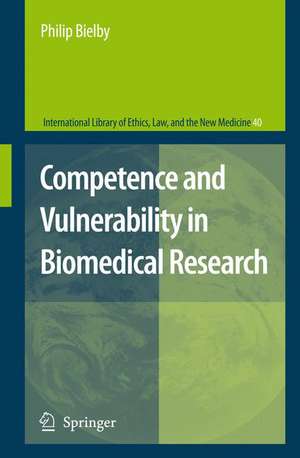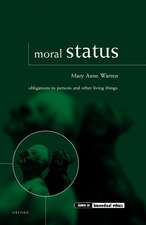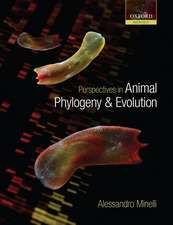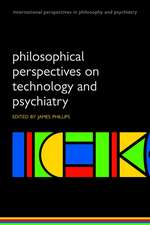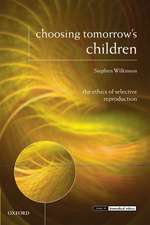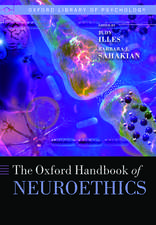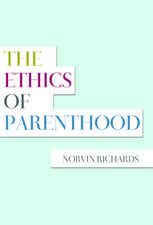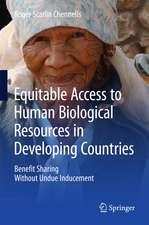Competence and Vulnerability in Biomedical Research: International Library of Ethics, Law, and the New Medicine, cartea 40
Autor Philip Bielbyen Limba Engleză Hardback – 13 sep 2008
In this book, the author develops a novel justificatory framework for making judgments of decisional competence to consent to biomedical research with reference to five groups of cognitively vulnerable individuals - older children and adolescents, adults with intellectual disabilities, adults with depression, adults with schizophrenia and adults with dementia, including Alzheimer’s disease. Using this framework, the author argues that we can make morally defensible judgments about the competence or incompetence of a potential participant to give contemporaneous consent to research by having regard to whether a judgment of competence would be more harmful to the ‘generic rights’ of the potential participant than a judgment of incompetence. The argument is also used to justify an account of supported decision-making in research, and applied to evaluate the extent to which this approach is evident in existing ethical guidelines and legal provisions. The book will be of interest to bioethicists as well as psychiatrists and academic medical lawyers interested in normative questions raised by the concepts of competence and capacity.
| Toate formatele și edițiile | Preț | Express |
|---|---|---|
| Paperback (1) | 942.44 lei 6-8 săpt. | |
| SPRINGER NETHERLANDS – 25 noi 2010 | 942.44 lei 6-8 săpt. | |
| Hardback (1) | 948.47 lei 6-8 săpt. | |
| SPRINGER NETHERLANDS – 13 sep 2008 | 948.47 lei 6-8 săpt. |
Din seria International Library of Ethics, Law, and the New Medicine
- 5%
 Preț: 347.30 lei
Preț: 347.30 lei -
 Preț: 397.26 lei
Preț: 397.26 lei - 15%
 Preț: 635.31 lei
Preț: 635.31 lei - 18%
 Preț: 942.76 lei
Preț: 942.76 lei - 5%
 Preț: 718.65 lei
Preț: 718.65 lei - 15%
 Preț: 634.68 lei
Preț: 634.68 lei - 15%
 Preț: 637.78 lei
Preț: 637.78 lei -
 Preț: 380.07 lei
Preț: 380.07 lei - 18%
 Preț: 959.98 lei
Preț: 959.98 lei - 15%
 Preț: 641.20 lei
Preț: 641.20 lei - 18%
 Preț: 944.19 lei
Preț: 944.19 lei - 15%
 Preț: 636.80 lei
Preț: 636.80 lei - 15%
 Preț: 643.00 lei
Preț: 643.00 lei - 18%
 Preț: 952.89 lei
Preț: 952.89 lei - 15%
 Preț: 643.48 lei
Preț: 643.48 lei - 18%
 Preț: 954.45 lei
Preț: 954.45 lei - 5%
 Preț: 1095.73 lei
Preț: 1095.73 lei - 15%
 Preț: 645.79 lei
Preț: 645.79 lei - 18%
 Preț: 1111.22 lei
Preț: 1111.22 lei - 15%
 Preț: 643.84 lei
Preț: 643.84 lei - 18%
 Preț: 1227.67 lei
Preț: 1227.67 lei - 18%
 Preț: 953.65 lei
Preț: 953.65 lei - 15%
 Preț: 638.57 lei
Preț: 638.57 lei - 5%
 Preț: 1101.21 lei
Preț: 1101.21 lei
Preț: 948.47 lei
Preț vechi: 1156.67 lei
-18% Nou
Puncte Express: 1423
Preț estimativ în valută:
181.50€ • 190.85$ • 149.96£
181.50€ • 190.85$ • 149.96£
Carte tipărită la comandă
Livrare economică 17 aprilie-01 mai
Preluare comenzi: 021 569.72.76
Specificații
ISBN-13: 9781402086038
ISBN-10: 1402086032
Pagini: 252
Ilustrații: XIV, 236 p.
Dimensiuni: 155 x 235 x 23 mm
Greutate: 0.53 kg
Ediția:2008
Editura: SPRINGER NETHERLANDS
Colecția Springer
Seria International Library of Ethics, Law, and the New Medicine
Locul publicării:Dordrecht, Netherlands
ISBN-10: 1402086032
Pagini: 252
Ilustrații: XIV, 236 p.
Dimensiuni: 155 x 235 x 23 mm
Greutate: 0.53 kg
Ediția:2008
Editura: SPRINGER NETHERLANDS
Colecția Springer
Seria International Library of Ethics, Law, and the New Medicine
Locul publicării:Dordrecht, Netherlands
Public țintă
ResearchCuprins
Five Concepts of Competence.- Consent, Vulnerability and Research.- Gewirth’s Theory of Agency Rights.- Proportionality, Precaution and Judgments of Competence.- The Competences of Cognitively Vulnerable Groups.- Cognitive Vulnerability and Consent to Biomedical Research.- Cognitive Vulnerability and Consent to Biomedical Research in England and Wales.- Cognitive Vulnerability and Consent to Biomedical Research in the United States.
Recenzii
From the reviews:
“‘Competence and Vulnerability in Biomedical Research’ develops a framework for evaluating the decisional competence of potential study subjects and providing appropriate support for those with impaired competence. Given the practical and ethical challenges of obtaining consent from the cognitively vulnerable, such a framework is welcome. The book studies five aspects of competence –– agency, task, decisional, societal and legal … . the text is very technical and best suited to bioethicists, attorneys and psychiatrists with an interest in the area.” (Norman M. Goldfarb, Journal of Clinical Research Best Practices, Vol. 7 (9), September, 2011)
“‘Competence and Vulnerability in Biomedical Research’ develops a framework for evaluating the decisional competence of potential study subjects and providing appropriate support for those with impaired competence. Given the practical and ethical challenges of obtaining consent from the cognitively vulnerable, such a framework is welcome. The book studies five aspects of competence –– agency, task, decisional, societal and legal … . the text is very technical and best suited to bioethicists, attorneys and psychiatrists with an interest in the area.” (Norman M. Goldfarb, Journal of Clinical Research Best Practices, Vol. 7 (9), September, 2011)
Notă biografică
Dr Phil Bielby is a lecturer in the Law School and a member of the Institute of Applied Ethics at The University of Hull. He holds a PhD from The University of Sheffield and has published in the fields of bioethics, medical law and critical legal education.
Textul de pe ultima copertă
Enhanced knowledge of the nature and causes of mental disorder have led increasingly to a need for the recruitment of ‘cognitively vulnerable’ participants in biomedical research. These individuals often fall into the ‘grey area’ between obvious decisional competence and obvious decisional incompetence and, as a result, may not be recognised as having the legal capacity to make such decisions themselves. At the core of the ethical debate surrounding the participation of cognitively vulnerable individuals in research is when, if at all, we should judge them decisionally and legally competent to consent to or refuse research participation on their own behalf and when they should be judged incompetent in this respect.
In this book, the author develops a novel justificatory framework for making judgments of decisional competence to consent to biomedical research with reference to five groups of cognitively vulnerable individuals - older children and adolescents, adults with intellectual disabilities, adults with depression, adults with schizophrenia and adults with dementia, including Alzheimer’s disease. Using this framework, the author argues that we can make morally defensible judgments about the competence or incompetence of a potential participant to give contemporaneous consent to research by having regard to whether a judgment of competence would be more harmful to the ‘generic rights’ of the potential participant than a judgment of incompetence. The argument is also used to justify an account of supported decision-making in research, and applied to evaluate the extent to which this approach is evident in existing ethical guidelines and legal provisions. The book will be of interest to bioethicists as well as psychiatrists and academic medical lawyers interested in normative questions raised by the concepts of competence and capacity.
Dr Phil Bielby is a lecturer in the Law School and a member of the Institute of Applied Ethics atThe University of Hull. He holds a PhD from The University of Sheffield and has published in the fields of bioethics, medical law and critical legal education.
In this book, the author develops a novel justificatory framework for making judgments of decisional competence to consent to biomedical research with reference to five groups of cognitively vulnerable individuals - older children and adolescents, adults with intellectual disabilities, adults with depression, adults with schizophrenia and adults with dementia, including Alzheimer’s disease. Using this framework, the author argues that we can make morally defensible judgments about the competence or incompetence of a potential participant to give contemporaneous consent to research by having regard to whether a judgment of competence would be more harmful to the ‘generic rights’ of the potential participant than a judgment of incompetence. The argument is also used to justify an account of supported decision-making in research, and applied to evaluate the extent to which this approach is evident in existing ethical guidelines and legal provisions. The book will be of interest to bioethicists as well as psychiatrists and academic medical lawyers interested in normative questions raised by the concepts of competence and capacity.
Dr Phil Bielby is a lecturer in the Law School and a member of the Institute of Applied Ethics atThe University of Hull. He holds a PhD from The University of Sheffield and has published in the fields of bioethics, medical law and critical legal education.
Caracteristici
Only book currently available to focus exclusively upon competence to consent to biomedical research Develops a novel theory of judging decisional competence Provides an argument for supported decision-making in research Integrates insights from moral philosophy, bioethics, psychiatry and medical law Has implications for the emerging field of neuroethics
